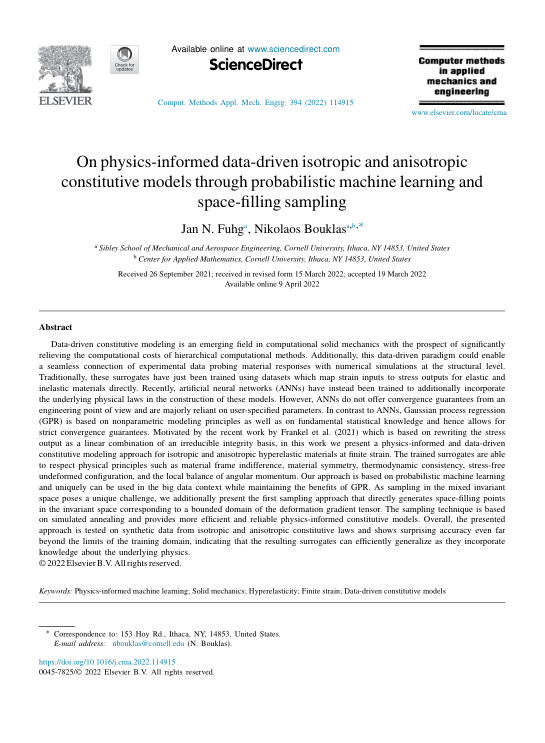On physics-informed data-driven isotropic and anisotropic constitutive models through probabilistic machine learning and space-filling sampling
Published in Computer Methods in Applied Mechanics and Engineering, 2022

Abstract
Data-driven constitutive modeling is an emerging field in computational solid mechanics with the prospect of significantly relieving the computational costs of hierarchical computational methods. Additionally, this data-driven paradigm could enable a seamless connection of experimental data probing material responses with numerical simulations at the structural level. Traditionally, these surrogates have just been trained using datasets which map strain inputs to stress outputs for elastic and inelastic materials directly. Recently, artificial neural networks (ANNs) have instead been trained to additionally incorporate the underlying physical laws in the construction of these models. However, ANNs do not offer convergence guarantees from an engineering point of view and are majorly reliant on user-specified parameters. In contrast to ANNs, Gaussian process regression (GPR) is based on nonparametric modeling principles as well as on fundamental statistical knowledge and hence allows for strict convergence guarantees. Motivated by the recent work by Frankel et al. (2021) which is based on rewriting the stress output as a linear combination of an irreducible integrity basis, in this work we present a physics-informed and data-driven constitutive modeling approach for isotropic and anisotropic hyperelastic materials at finite strain. The trained surrogates are able to respect physical principles such as material frame indifference, material symmetry, thermodynamic consistency, stress-free undeformed configuration, and the local balance of angular momentum. Our approach is based on probabilistic machine learning and uniquely can be used in the big data context while maintaining the benefits of GPR. As sampling in the mixed invariant space poses a unique challenge, we additionally present the first sampling approach that directly generates space-filling points in the invariant space corresponding to a bounded domain of the deformation gradient tensor. The sampling technique is based on simulated annealing and provides more efficient and reliable physics-informed constitutive models. Overall, the presented approach is tested on synthetic data from isotropic and anisotropic constitutive laws and shows surprising accuracy even far beyond the limits of the training domain, indicating that the resulting surrogates can efficiently generalize as they incorporate knowledge about the underlying physics. © 2022 Elsevier B.V.
